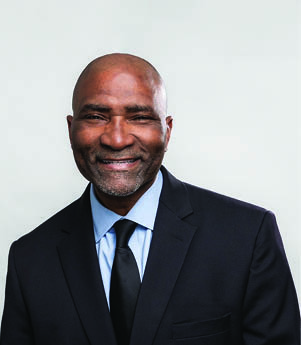Building the Resilience and Capacity of Leaders

The impact of school leaders and educators is not only determined by our ability to teach but by our ability to learn and be curious. The past few years have taught us so much, and if we do not learn from the past, we will not be able to create a new future for our students. That future must include schools that promote a sense of belonging, where all people are recognized.
Twenty-three years ago, I walked into my first school as a principal after spending nearly 13 years as a high school and middle school teacher and assistant principal. I was ready to make an impact on the very community where I grew up—the public housing projects of North Philadelphia. Life as a student and teacher in the City of Brotherly Love was not easy, but it made me resilient, and I learned many life lessons. My resilience has truly been tested during my career, and even more so over the past four years. In my 36 years as an educator, I have never seen our schools and communities impacted by anything like the pandemic—and the years that have followed where we continue to recover.

Effective leaders have always managed people, time, and resources well, but the ability to inspire and motivate staff is more challenging now. Cultivating school cultures where joy, resilience, and learning exist daily has become a daunting task. COVID-19 forced schools to close and rethink how we operate. From fully remote learning to hybrid instruction to resuming in-person teaching and learning, we have been required to offer lots of flexibility.
For the past 12 years, I have been a K–8 principal in Wilmington, DE, and my No. 1 goal has been to build a school culture where strong relationships with students and families are a priority. Also, I have been committed to ensuring that our teachers and staff are celebrated regularly and know that they are appreciated beyond national Teacher Appreciation Week, the first full week of May each year. This focus on school culture paid huge dividends in our school, which had a 90% retention rate in the early stages of the pandemic.
To develop my own leadership capacity and resilience, I have tried my best to connect with other leaders in my state. I benefit from a strong professional relationship with my colleagues, Dr. Joseph Jones and Dr. T.J. Vari, both former principals and now district leaders here in Delaware. We connected, formed a team, and wrote three books on leadership together: Passionate Leadership: Creating a Culture of Success in Every School; Building a Winning Team: The Power of a Magnetic Reputation and the Need to Recruit Top Talent in Every School; and Retention for a Change: Motivate, Inspire, and Energize Your School Culture. My co-authors and I agreed before the pandemic that we would be committed to preparing leaders to help ease the teacher shortage, and to support them in developing positive school cultures.
As we all know, COVID only exacerbated the educator hiring crisis. The Bureau of Labor Statistics reported that about 600,000 teachers quit between January 2020 and February 2022, and we have not been able to replace them. Schools have been impacted tremendously as some teaching positions have remained vacant all school year. The tea kettle has been simmering for over a decade; the pandemic was just the tipping point.
Why Resilience Matters
There is so much pressure on school leaders to support teachers, students, and parents that it can be difficult to sustain any positivity. This is why resilience is so important. When we build it, we can embrace our roles as learners, reflect on our work, adapt to changes, and ultimately remain optimistic in the most challenging times.
To lead effectively, school leaders must operate with a growth mindset and feel inspired. But even the most resilient leaders grow tired at times and need inspiration. As we near the end of this school year, I offer the following strategies with the hope that they inspire you in building resilience for the next school year:
- Develop a support network with other administrators in your area—and globally—on social media. This type of engagement has been key for me and many other school leaders during the past few years. Twitter, Facebook, LinkedIn, and other forms of social media are effective ways to connect with leaders in our state and around the nation. Memberships in professional organizations, such as NASSP, and attending conferences, such as Ignite 2023, allow us to engage in fellowship with our colleagues and learn best practices from them.
- Begin to listen more as leaders and don’t be afraid to show vulnerability. Listening can be healing, and it allows us to develop deep relationships with those in our care. Connecting with others shows us we are not alone in the struggles our schools face and that there are others who have our backs in times of adversity. The past few years have been full of trauma, and we must find ways to bring optimism and joy into our schools. Empathetic leadership is needed everywhere.
- Build resilient communities in school. During stressful times, our students and staff need to feel seen, heard, and valued. To that end, developing a sense of belonging is crucial. Notice all stakeholders and focus on creating safe spaces for them to take risks, be creative, and be curious.
- Protect your own resilience. Be more forgiving of yourself, and show “you” some grace and mercy. Be inspired by the resilience of the teachers and students who have been through remote learning, mask-wearing, and other COVID-19 protocols. Never forget your purpose in life and how you are making an impact. Remember why you chose this profession. Your school and community are inspired by your story, triumphs, and struggles. To succeed, they need you at your best.
Deepening Our Capacity
Some might ask, why deepen our capacity to lead? Why improve our leadership skills? The reason is powerful yet simple: When we improve, our schools, teachers, and students improve. The principal is the key facilitator of culture in school, and one of our primary focuses should be helping our students and teachers improve outcomes. When we support teachers and promote their curiosity, we help to build their capacity. Strong leaders motivate their staff to overcome challenges and get everyone working together toward the same goals.
As a better leader, you will build strong relationships. Trust is the engine that drives relationships. When you learn how to motivate and inspire others, they will be more likely to trust and respect you and embrace change and challenges. We can deepen and improve our leadership skills. After all, they are skills we can learn, and they are essential.
Salome Thomas-EL, EdD, is the principal of Thomas Edison Charter School in Wilmington, DE, and the author and co-author of five books including I Choose to Stay: A Black Teacher Refuses to Desert the Inner City. He will be a keynote speaker at Ignite 2023 in July.
To register for Ignite 2023, visit ignite.nassp.org.
Sidebar: Ways to Embrace Leading and Learning in Your School

Remember to view each day in school as an opportunity to learn. When we fail to embrace learning, we will always revert to what did not work in our schools before. Below are some important areas of focus for next school year.
- Listening to staff and students
- Focusing on culture from day one
- Inspiring and motivating often
- Supporting and fostering change
- Building relationships and trust
- Making evidence-based decisions
- Developing systems and procedures
- Preparing for what you can
- Being an equity- and trauma-focused leader
- Communicating and giving feedback often
- Embracing learning
- Setting a school vision
- Protecting teachers’ time
- Delegating to assistant principals to build their leadership capacity
